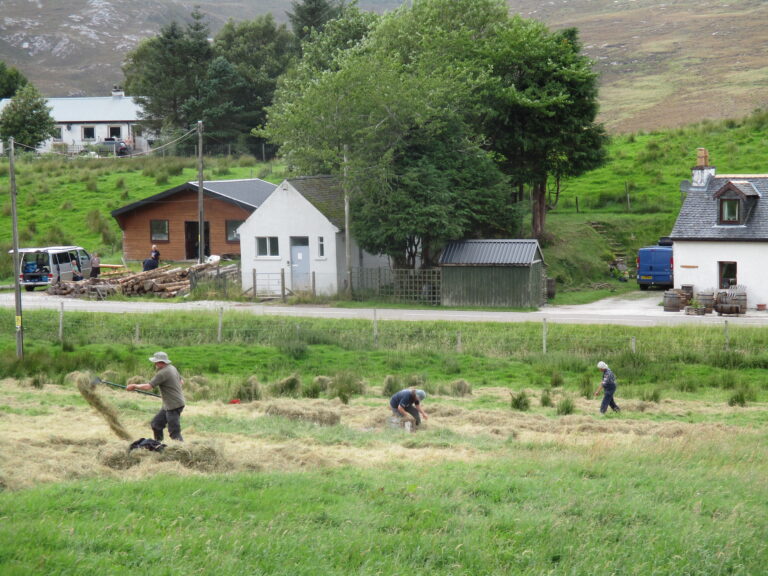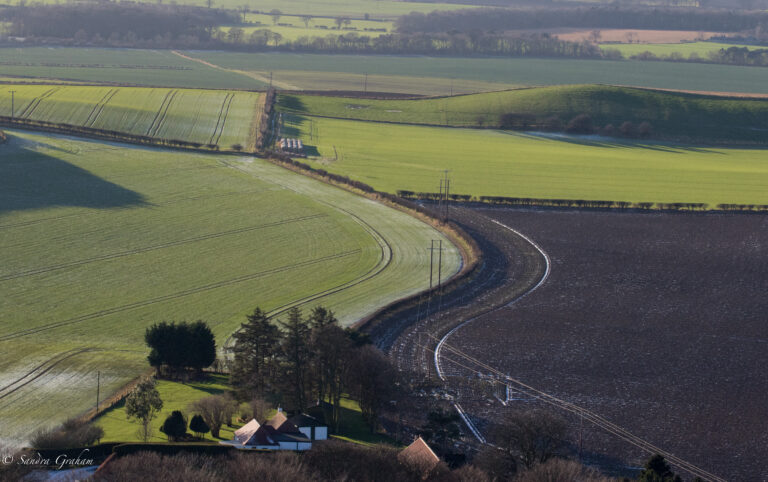%22%20transform%3D%22matrix(3%200%200%203%201.5%201.5)%22%20fill-opacity%3D%22.5%22%3E%3Cellipse%20fill%3D%22%2341642a%22%20cx%3D%2284%22%20cy%3D%22141%22%20rx%3D%2285%22%20ry%3D%2284%22%2F%3E%3Cpath%20fill%3D%22%23f6ae36%22%20d%3D%22M238.6-25.2l52.3%2080.5-101.5%2066-52.3-80.6z%22%2F%3E%3Cpath%20fill%3D%22%23fbb139%22%20d%3D%22M108.5-29.1l21%2064.7L-4.4%2079l-21-64.7z%22%2F%3E%3Cellipse%20fill%3D%22%23575e2b%22%20cx%3D%22107%22%20cy%3D%2294%22%20rx%3D%2236%22%20ry%3D%2250%22%2F%3E%3C%2Fg%3E%3C%2Fsvg%3E)
Good quality ponds, especially warm ones, are vital breeding habitats for amphibians in the spring, when spawn and tadpoles will be using them to develop into adults. Often farm ponds suffer from agricultural run-off - but there are practical measures farmers can take to address this.
%22%20transform%3D%22matrix(3%200%200%203%201.5%201.5)%22%20fill-opacity%3D%22.5%22%3E%3Cellipse%20fill%3D%22%23d2d1ff%22%20cx%3D%22122%22%20cy%3D%2226%22%20rx%3D%22237%22%20ry%3D%2235%22%2F%3E%3Cellipse%20fill%3D%22%23434f00%22%20rx%3D%221%22%20ry%3D%221%22%20transform%3D%22matrix(-254.82874%209.34415%20-2.2447%20-61.21654%20148.3%20146.3)%22%2F%3E%3Cellipse%20fill%3D%22%238b95ff%22%20rx%3D%221%22%20ry%3D%221%22%20transform%3D%22matrix(-66.24786%208.83935%20-3.56827%20-26.74294%20128.8%2017.8)%22%2F%3E%3Cpath%20fill%3D%22%23443d63%22%20d%3D%22M39%2091l232%2039V65z%22%2F%3E%3C%2Fg%3E%3C%2Fsvg%3E)
Native breeds should be seen as crucial in bringing greater sustainability to modern farming and land management practices, and government policy and funding should reflect this, says Steve McMinn.
%27%20fill-opacity%3D%27.5%27%3E%3Cellipse%20fill%3D%22%233b3654%22%20fill-opacity%3D%22.5%22%20rx%3D%221%22%20ry%3D%221%22%20transform%3D%22matrix(-74.3026%20136.2806%20-222.17172%20-121.13196%20392%2099)%22%2F%3E%3Cellipse%20fill%3D%22%23b4c460%22%20fill-opacity%3D%22.5%22%20rx%3D%221%22%20ry%3D%221%22%20transform%3D%22rotate(-86.8%20532.8%20-57)%20scale(119.56774%20592.62293)%22%2F%3E%3Cellipse%20fill%3D%22%2375708d%22%20fill-opacity%3D%22.5%22%20rx%3D%221%22%20ry%3D%221%22%20transform%3D%22matrix(-245.9983%20-205.31642%2055.14837%20-66.0756%20125.7%20114.6)%22%2F%3E%3Cellipse%20fill%3D%22%23b8b2d6%22%20fill-opacity%3D%22.5%22%20rx%3D%221%22%20ry%3D%221%22%20transform%3D%22matrix(6.99982%20-67.73588%20120.8016%2012.48363%20766.4%209.4)%22%2F%3E%3C%2Fg%3E%3C%2Fsvg%3E)
A thriving agricultural sector, embracing a diversity of scales and types of farming and crofting across the whole Highlands, is vital to achieve a Good Food Future, says Helen O'Keefe.
%27%20fill-opacity%3D%27.5%27%3E%3Cellipse%20fill%3D%22%239ba56a%22%20fill-opacity%3D%22.5%22%20rx%3D%221%22%20ry%3D%221%22%20transform%3D%22rotate(14.8%20-1727.8%201989.5)%20scale(686.20901%20198.89569)%22%2F%3E%3Cellipse%20fill%3D%22%23000005%22%20fill-opacity%3D%22.5%22%20rx%3D%221%22%20ry%3D%221%22%20transform%3D%22matrix(.57336%20-106.54204%20764.98892%204.11682%20281%2067.7)%22%2F%3E%3Cellipse%20fill%3D%22%235d5878%22%20fill-opacity%3D%22.5%22%20rx%3D%221%22%20ry%3D%221%22%20transform%3D%22matrix(179.6738%20-118.02362%2064.90195%2098.80378%20282.9%20260)%22%2F%3E%3Cellipse%20fill%3D%22%23384900%22%20fill-opacity%3D%22.5%22%20rx%3D%221%22%20ry%3D%221%22%20transform%3D%22matrix(241.76196%20-89.91665%2043.16505%20116.05935%20656%20244.5)%22%2F%3E%3C%2Fg%3E%3C%2Fsvg%3E)
Nature-friendly and sustainable farming practices go hand-in-hand with higher farm animal welfare, says the charity Compassion in World Farming. By transitioning away from industrial livestock monocultures and towards extensive, regenerative systems, higher-welfare farming reduces stocking densities and reintegrates animals with the land.
%22%20transform%3D%22matrix(3%200%200%203%201.5%201.5)%22%20fill-opacity%3D%22.5%22%3E%3Cellipse%20fill%3D%22%23a3a598%22%20cx%3D%2291%22%20rx%3D%2279%22%20ry%3D%2279%22%2F%3E%3Cellipse%20fill%3D%22%231d1c1e%22%20rx%3D%221%22%20ry%3D%221%22%20transform%3D%22matrix(159.23993%20-30.77537%208.96443%2046.38434%20185.5%20129)%22%2F%3E%3Cellipse%20fill%3D%22%23080808%22%20rx%3D%221%22%20ry%3D%221%22%20transform%3D%22matrix(40.3817%20-6.626%202.7861%2016.97975%20239.8%20148.1)%22%2F%3E%3Cellipse%20fill%3D%22%23090909%22%20rx%3D%221%22%20ry%3D%221%22%20transform%3D%22matrix(-30.08715%20-9.834%206.53639%20-19.99811%20131.7%20159)%22%2F%3E%3C%2Fg%3E%3C%2Fsvg%3E)
Food production requires more than a farmer with a field. Farming depends on the wider environment – healthy soils, populations of pollinators, and climatic conditions suitable for growing crops. There is no food security without a stable climate and healthy natural environment.
%27%20fill-opacity%3D%27.5%27%3E%3Cellipse%20fill%3D%22%23fff%22%20fill-opacity%3D%22.5%22%20rx%3D%221%22%20ry%3D%221%22%20transform%3D%22matrix(7.57587%20-88.36871%20737.64838%2063.23877%20454.7%2052.6)%22%2F%3E%3Cellipse%20fill%3D%22%23372c29%22%20fill-opacity%3D%22.5%22%20rx%3D%221%22%20ry%3D%221%22%20transform%3D%22matrix(511.86552%2026.42967%20-5.74445%20111.2533%20335.4%20318.2)%22%2F%3E%3Cellipse%20fill%3D%22%23fafcfc%22%20fill-opacity%3D%22.5%22%20rx%3D%221%22%20ry%3D%221%22%20transform%3D%22matrix(762.68507%2059.46831%20-4.7461%2060.86896%20398%201.5)%22%2F%3E%3Cellipse%20fill%3D%22%231f2627%22%20fill-opacity%3D%22.5%22%20rx%3D%221%22%20ry%3D%221%22%20transform%3D%22rotate(-90.1%20292.9%2092.4)%20scale(112.32089%2088.2436)%22%2F%3E%3C%2Fg%3E%3C%2Fsvg%3E)
We spoke with Johnnie Balfour from Balbirnie Home Farms in Fife about the way his farming is evolving to be better for nature and the climate, about some of the problems with Scotland’s current farm funding system, and about what he would like the new system to do.
%27%20fill-opacity%3D%27.5%27%3E%3Cellipse%20fill%3D%22%23bbb8ca%22%20fill-opacity%3D%22.5%22%20rx%3D%221%22%20ry%3D%221%22%20transform%3D%22matrix(-14.53213%20169.50994%20-716.22022%20-61.40173%20448.4%2072.4)%22%2F%3E%3Cellipse%20fill%3D%22%23142100%22%20fill-opacity%3D%22.5%22%20rx%3D%221%22%20ry%3D%221%22%20transform%3D%22matrix(6.6434%20-122.66681%20763.88057%2041.3703%20271.5%20482.6)%22%2F%3E%3Cellipse%20fill%3D%22%23b3b3b3%22%20fill-opacity%3D%22.5%22%20rx%3D%221%22%20ry%3D%221%22%20transform%3D%22matrix(454.89713%20-2.2659%20.52266%20104.92863%20366.5%2023.7)%22%2F%3E%3Cellipse%20fill%3D%22%233c4900%22%20fill-opacity%3D%22.5%22%20rx%3D%221%22%20ry%3D%221%22%20transform%3D%22matrix(-15.5755%20-141.08105%20504.7202%20-55.72163%20393.9%20537.4)%22%2F%3E%3C%2Fg%3E%3C%2Fsvg%3E)
The Scottish Government must commit to a radical new system of farm funding to deal with climate change, environmental campaigners have said. The call comes after new figures show that climate emissions from agriculture have risen to become the second largest source of Scottish emissions.






